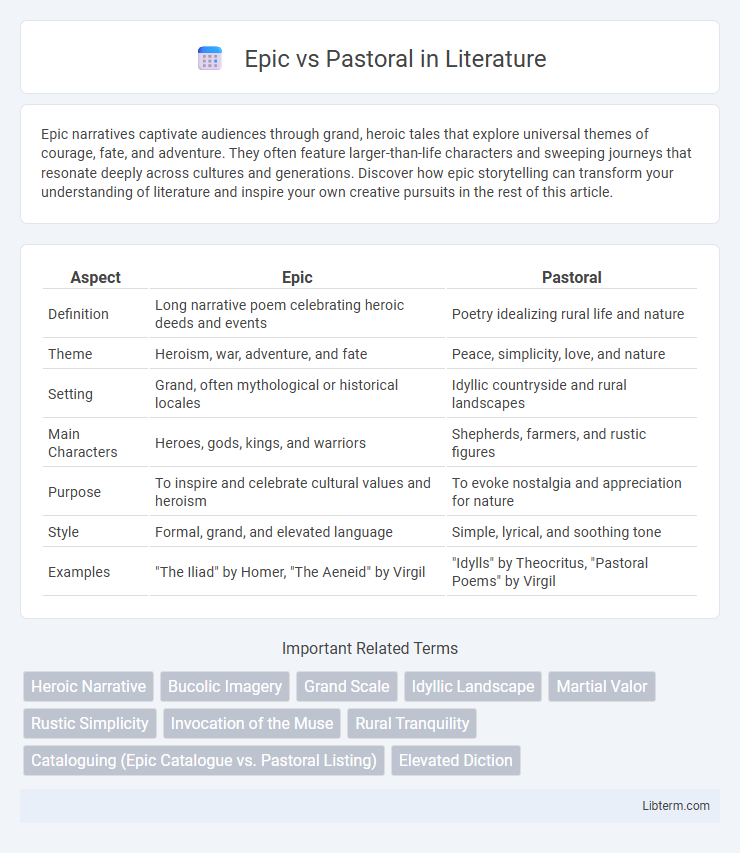Epic narratives captivate audiences through grand, heroic tales that explore universal themes of courage, fate, and adventure. They often feature larger-than-life characters and sweeping journeys that resonate deeply across cultures and generations. Discover how epic storytelling can transform your understanding of literature and inspire your own creative pursuits in the rest of this article.
Table of Comparison
| Aspect | Epic | Pastoral |
|---|---|---|
| Definition | Long narrative poem celebrating heroic deeds and events | Poetry idealizing rural life and nature |
| Theme | Heroism, war, adventure, and fate | Peace, simplicity, love, and nature |
| Setting | Grand, often mythological or historical locales | Idyllic countryside and rural landscapes |
| Main Characters | Heroes, gods, kings, and warriors | Shepherds, farmers, and rustic figures |
| Purpose | To inspire and celebrate cultural values and heroism | To evoke nostalgia and appreciation for nature |
| Style | Formal, grand, and elevated language | Simple, lyrical, and soothing tone |
| Examples | "The Iliad" by Homer, "The Aeneid" by Virgil | "Idylls" by Theocritus, "Pastoral Poems" by Virgil |
Defining Epic and Pastoral Genres
Epic genres are characterized by grand, heroic narratives often centered on legendary figures and monumental events, emphasizing themes of valor, fate, and cultural identity. Pastoral genres focus on idealized rural life, celebrating nature, simplicity, and harmony through poetic depictions of shepherds and countryside settings. Both genres use distinct stylistic and thematic elements to explore human experience, with epics highlighting collective heroism and pastorals emphasizing tranquility and rustic beauty.
Historical Origins of Epic and Pastoral
The historical origins of epic literature trace back to ancient Mesopotamian and Greek civilizations, exemplified by works such as the "Epic of Gilgamesh" and Homer's "Iliad," which served to preserve cultural myths, heroic deeds, and societal values. Pastoral literature, emerging prominently during the Hellenistic period and later flourishing in the Renaissance with authors like Theocritus and Virgil, idealized rural life and nature as a counterpoint to urban complexity and political turmoil. These genres reflect distinct cultural priorities: epics emphasize grand historical narratives and heroism, while pastorals focus on simplicity, harmony, and the natural world.
Major Themes in Epic Literature
Epic literature often explores themes of heroism, honor, and the struggle between good and evil, emphasizing grand, heroic deeds and the fate of civilizations. It centers on larger-than-life characters whose journeys reflect cultural values and existential challenges. Contrastingly, pastoral themes highlight the simplicity and harmony of rural life, focusing on nature, innocence, and idyllic landscapes.
Key Characteristics of Pastoral Works
Pastoral works emphasize idealized rural life, featuring shepherds and nature as central elements to explore themes of simplicity, harmony, and escape from urban complexity. These literary pieces often use bucolic settings to highlight innocence, love, and the contrast between civilization and the natural world. Symbolism of nature and the pastoral landscape plays a crucial role in evoking tranquility and nostalgia within the genre.
Structural Differences Between Epic and Pastoral
Epic poetry features a complex and extended narrative structure with multiple episodes, focusing on heroic deeds and grand themes, often divided into cantos or books. Pastoral poetry employs a simpler, lyrical structure centered around idyllic rural settings and shepherds, using shorter, more intimate verses or eclogues. The epic's formal organization contrasts with the pastoral's emphasis on conversational and celebratory forms, reflecting their divergent thematic concerns.
Prominent Examples of Epic Poems
Epic poems such as Homer's *Iliad* and *Odyssey* exemplify grand narrative verse structured around heroic deeds and divine intervention, serving as foundational texts in Western literature. Virgil's *Aeneid* continues this tradition with its blend of myth and Roman history, shaping cultural identity through epic storytelling. These works contrast with pastoral poetry by emphasizing monumental themes of war, destiny, and heroism rather than rural life and simplicity.
Influential Pastoral Writers and Works
Influential pastoral writers such as Theocritus, often hailed as the originator of the pastoral genre, and Virgil, whose "Eclogues" established the framework for pastoral poetry, played crucial roles in shaping the tradition. Edmund Spenser's "The Shepheardes Calender" reinvigorated pastoral themes during the English Renaissance, while Christopher Marlowe's "The Passionate Shepherd to His Love" remains a quintessential pastoral lyric. These seminal works emphasize idealized rural life and nature, contrasting the grand historical narratives and heroic deeds characteristic of epic literature.
Symbolism and Imagery in Epic vs Pastoral
Epic poetry employs grand symbolism and vivid imagery to evoke heroic ideals and monumental struggles, often featuring gods, battles, and cosmic settings that symbolize universal themes of honor, fate, and human destiny. Pastoral poetry uses bucolic symbolism and gentle imagery centered on rural life, nature, and simplicity, portraying shepherds, rustic landscapes, and the harmony between humans and the natural world as symbols of innocence and idyllic existence. The contrasting imagery in epic and pastoral genres highlights the tension between civilization and nature, grandeur and simplicity, conflict and peace.
Purpose and Audience of Each Genre
Epic poetry serves to celebrate heroic deeds and cultural ideals, targeting a broad audience that values tradition and collective identity. Pastoral literature aims to idealize rural life and nature, appealing to readers seeking escapism and reflection on simplicity. Each genre uses its unique narrative style to engage its specific purpose and audience effectively.
Lasting Impact of Epic and Pastoral Traditions
Epic traditions have a lasting impact by preserving cultural values, heroic ideals, and historical narratives that shape national identities and collective memory. Pastoral traditions contribute enduring insights into rural life, nature, and simplicity, influencing literary themes and environmental appreciation across generations. Together, they form complementary legacies, with epics emphasizing grand, communal experiences and pastorals highlighting intimate, natural settings.
Epic Infographic

 libterm.com
libterm.com